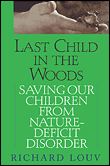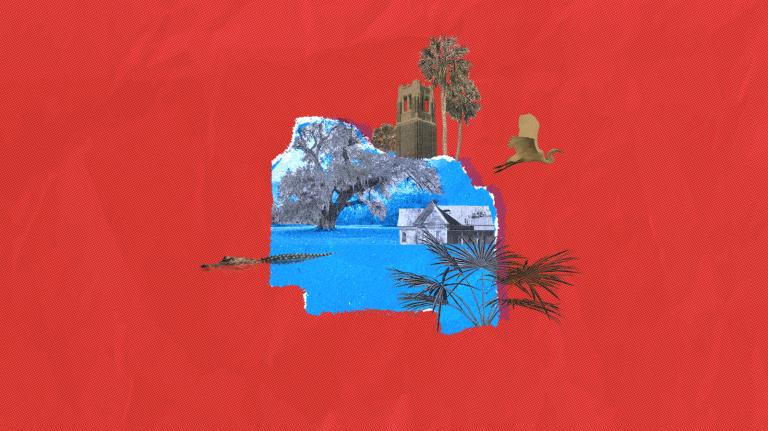OK, call me a crank, a malcontent, a hypercritical reviewer with a small, crabbed heart. But despite all its earnestness, despite its heartfelt message, which an environmentalist and concerned parent like me should embrace — in brief, that nature is good for children — Richard Louv’s plea to reengage our children with nature left me strangely uninspired. As with all good ideas, it is one worth repeating, but I would have been happier reading Emerson, I think, for the lesson.
Louv, a columnist for the San Diego Union-Tribune, has written a number of books about child rearing. His latest, Last Child in the Woods: Saving Our Children from Nature-Deficit Disorder — coming out in paperback this spring — is a cri de coeur, a passionate polemic against the disaffection and disconnection from nature that characterizes our current generation of plugged-in kids. “I like to play indoors better ’cause that’s where all the electrical outlets are,” says one fourth-grader in the book. It’s a statement guaranteed to strike terror into the hearts of anyone who, as naturalist John Burroughs did, goes “to nature to be soothed and healed, and to have my senses put in tune once more.”
Louv demonstrates in great detail that more and more of today’s children do not experience the natural world: they don’t hike, don’t play in their backyards, don’t climb trees, don’t build tree houses, catch frogs, imprison fireflies in Mason jars, or know the difference between Mickey Mouse and a dusky-footed wood rat. What becomes of them, says Louv — reflecting our culture’s propensity to pathologize all problems — is that they fall victim to “nature-deficit disorder.”
This disorder, he writes, “describes the human costs of alienation from nature, among them: diminished use of the senses, attention difficulties, and higher rates of physical and emotional illnesses. The disorder can be detected in individuals, families, and communities. Nature deficit can even change human behavior in cities, which could ultimately affect their design, since long-standing studies show a relationship between the absence, or inaccessibility, of parks and open space with high crime rates, depression, and other urban maladies.” Conversely, maintains Louv, exposure to and experience in nature is essential to a human’s well-being, learning abilities, and social skills.
As Louv acknowledges, there’s a significant problem with this argument: “research on the impact of nature experiences on attention disorders and on wider aspects of child health and development is in its infancy, and easily challenged.” More data and analysis is needed, continues Louv, “but we do not have to wait for it.” Oh? To hell with empirical proof, he says: “For many of us, intuition emphatically asserts that nature is good for children.”
You’d never catch me saying nature is bad for children, and I certainly agree that “nature presents the young with something so much greater than they are; it offers an environment where they can easily contemplate infinity and eternity.” But in prosecuting his case — with passion, certainly, but not nearly enough rigor, or consideration of its moral dimension — Louv virtually condemns the nature-deprived among us to lives of physical and mental deformation. “In our bones we need the natural curves of hills, the scent of chaparral, the whisper of pines, the possibility of wildness,” he writes. “We require these patches of nature for our mental health and our spiritual resilience.”
Note the emphatic use of the word “require.” Similarly, Louv says, “to take nature and natural play away from children may be tantamount to withholding oxygen.” But such condemnation of psyches that do not have access to a rich experience of the natural world is a failure of imagination on Louv’s part. I know plenty of boring and narrow-minded naturalists, and I know a lot of exquisitely sensitive and creative people who grew up enduring the sensory assaults of our cities’ asphalt canyons. They found solace and quiet and beauty in public libraries and museums more often than not. So I’m deeply uncomfortable with the notion that nature deprivation leads to warped souls.
I do agree with Louv that the experience of nature can be a key element in psychological and physical well-being — I just don’t think it’s the only one. And I’m not sure he needed to write a book about the issue at all, because it’s really an old problem dressed up with new jargon. He attempts to quantify, in a way our mechanistic and technologically attuned world demands, something many of us already perceive. He characterizes the problem as a cultural illness, and he has a prescription: “More time in nature — combined with less television and more stimulating play and educational settings — may go a long way toward reducing attention deficits in children, and, just as important, increasing their joy in life.”
The idea of nature as medicine and redemption is thousands of years old. So why isn’t it enough to simply turn to the wisdom of our elders, who knew about this problem long before it had a name? Indeed, some of the best parts of Louv’s book are the quotations at the beginning of chapters, by nature-lovers from Vincent van Gogh to Thoreau, Rachel Carson, and Luther Standing Bear. (Louv could have quoted my mother, too, who would, when things got rough in the house, say one of two things to us kids: “go read a book” or “go outside.”)
More to the point, there’s danger in approaching nature in such a utilitarian fashion in today’s society. Using it as prescription medicine runs the risk that once we discover a pill that can cure the malaise incited by nature’s absence, then nature will have less value to us. That value is entirely apart from what nature can do for us, and it is trivialized when it is made, as Louv writes, “an essential investment in our children’s health.” A bicycle helmet is an essential investment in our children’s health; an old-growth forest or even an anthill are, please god, more than that.
From my own empirical research as the mother of two, I’d venture to say that staying inside too much can indeed do weird things to people, simply because it puts us in a context where our existence is the primary reference point. We become the center of our human-made worlds. Maybe it’s the loss of a sense of proportion that Louv ultimately rues, the very appropriate sense that we, as humans, are only a small part of a much larger creation. That awareness can be gleaned from nature, but it can come from other quarters too: prayer, history class, a grandparent’s reminiscences. It’s less important whence it comes, than that it comes at all.
Read an interview with Richard Louv.


